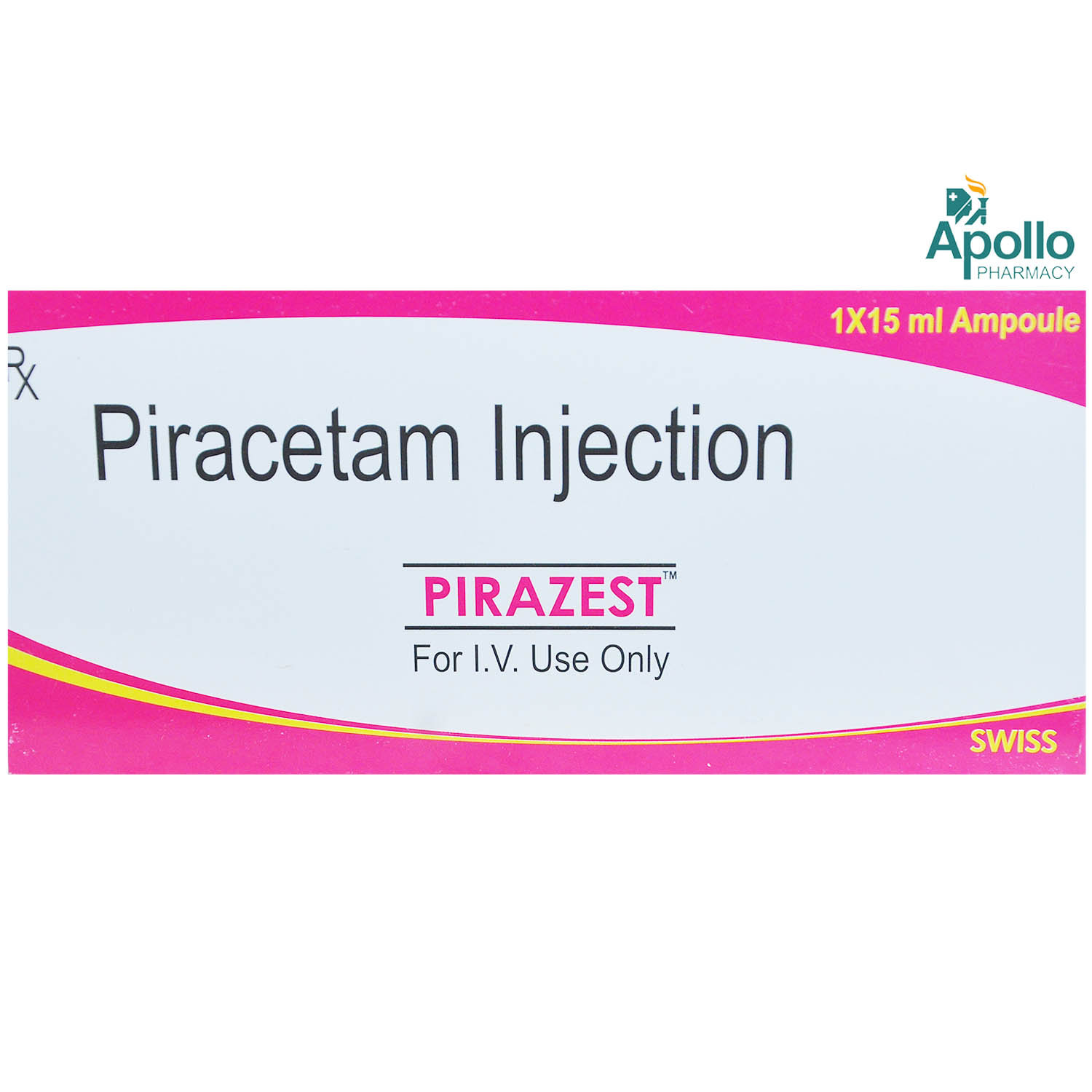Piracetam
About Piracetam
Piracetam belongs to a group of medicines called GABA analogues used to treat myoclonus (a movement disorder). Additionally, Piracetam is also used to treat memory disorders, vertigo, and dyslexia (learning disorder) in children above 8years. Myoclonus is a movement disorder that causes uncontrollable twitching and jerky movements of arms and legs.
Piracetam contains 'Piracetam' that acts on the brain and nervous system, thereby protects against shortness of oxygen. It also improves the activity of a chemical messenger called acetylcholine which helps in communication between brain cells.
You are advised to take Piracetam for as long as your doctor has prescribed it for you depending on your medical condition. In some cases, you may experience certain common side-effects such as headache, sleepiness, stomach pain, diarrhoea, weakness, nausea, and restlessness. You are advised to talk to your doctor if the side-effects persist or worsen.
Please do not stop taking Piracetam without consulting your doctor. Consult your doctor if you are pregnant or breastfeeding. Avoid driving or operating machinery as Piracetam causes drowsiness, sleepiness and shakiness. Avoid consuming alcohol along with Piracetam as it could lead to increased sleepiness. Piracetam is not recommended for children below 8 years as the safety and effectiveness have not been established.
Uses of Piracetam
Medicinal Benefits
Piracetam is a nootropic drug which belongs to a group of medicines called GABA analogues. Piracetam is used to treat myoclonus (a movement disorder). Additionally, Piracetam is also used for the symptomatic treatment of cognitive and memory disorders caused due to organic disorder, vertigo, and dyslexia (learning disorder) in children above 8 years. Piracetam acts on the brain, and nervous system thereby protecting against shortness of oxygen. It also improves the activity of a chemical messenger called acetylcholine which helps in communication between brain cells. Piracetam may also act on the N-methyl-D-aspartate (NMDA) receptors that are involved in the transmission of nerve signals which play an important role in memory.
Directions for Use
Storage
Side Effects of Piracetam
- Headache
- Sleepiness
- Stomach pain
- Diarrhoea
- Weakness
- Nausea
- Restlessness
Drug Warnings
Do not take Piracetam if you are allergic to any of its components; if you have/had a serious kidney problem, Huntington's disease or brain haemorrhage. Inform your doctor if you have kidney dysfunction or bleeding problems. Consult your doctor if you are pregnant, planning for pregnancy or breastfeeding. Avoid driving or operating machinery as Piracetam may cause drowsiness, sleepiness and shakiness. Avoid consuming alcohol along with Piracetam as it could lead to increased sleepiness. Piracetam is not recommended for children below 8 years as safety and effectiveness have not been established.
Drug Interactions
Drug-Drug Interactions: Piracetam may interact with hormone (thyroxine), anti-coagulant (warfarin, acenocoumarol), and painkiller (aspirin).
Drug-Food Interactions: No interactions found/established.
Drug-Disease Interactions: Inform your doctor if you have kidney impairment, Huntington's disease, brain haemorrhage, or bleeding problems.
Drug-Drug Interactions Checker List:
Safety Advice

Alcohol
unsafeAvoid consumption of alcohol while taking Piracetam as it may cause increased drowsiness and sleepiness.

Pregnancy
cautionPlease consult your doctor before taking Piracetam if you are pregnant.

Breast Feeding
cautionPlease consult your doctor if you are breastfeeding; your doctor will decide whether Piracetam can be taken by breastfeeding mothers or not.

Driving
unsafePiracetam may cause drowsiness and shakiness. Do not drive or operate machinery.

Liver
cautionDose adjustment may be needed in patients with liver impairment. Please consult your doctor if you have a liver impairment or any concerns regarding this.

Kidney
cautionDose adjustment may be needed in patients with kidney impairment. Please consult your doctor if you have kidney impairment or any concerns regarding this.

Children
cautionPiracetam is not recommended for children below 8 years as safety and effectiveness have not been established. Piracetam may be prescribed for dyslexia (learning disorder) in children above 8 years.
Habit Forming
Diet & Lifestyle Advise
- Maintain proper weight by following a healthy diet.
- Exercise regularly as it helps in less cognitive decline and brain volume loss.
- Avoid smoking and alcohol consumption.
- Try to avoid stress by practising meditation or yoga.
- Include fruits and vegetables in your diet as they contain anti-oxidants.
- Avoid late-night exercises as they can increase muscle twitches.
- Create a bed-time routine as it helps in relaxation and stress reduction.
- Follow a healthy lifestyle as it helps in improving overall health and possibly protects the brain.
Patients Concern
Disease/Condition Glossary
Myoclonus: Myoclonus is a movement disorder that causes uncontrollable twitching and jerky movements of arms and legs. It causes sudden muscle spasms which are involuntary and uncontrollable. It might involve one muscle or group of muscles and can occur randomly or in a pattern. Myoclonus is generally a clinical sign of an underlying disease rather than the condition itself. Myoclonic jerks or twitches are caused by sudden muscle contractions, called positive myoclonus or muscle relaxations, called negative myoclonus. Myoclonus is a symptom of neurological disorders that occur due to disturbance in the brain or spinal cord or peripheral nerve injury.
Vertigo: Vertigo is a sudden external or internal spinning sensation which causes a feeling of off-balance.
Dyslexia: Dyslexia is a learning disorder characterised by reading and learning problems.
FAQs
Piracetam acts on the brain, and nervous system thereby protects against shortness of oxygen. It also improves the activity of a chemical messenger called acetylcholine which helps in communication between brain cells.
Piracetam is used in the symptomatic treatment of cognitive and memory disorders caused due to organic disorders. However, Piracetam does not treat neurodegenerative dementia (memory loss) such as Alzheimer's disease.
Do not discontinue Piracetam without consulting your doctor. To treat your condition effectually, continue taking Piracetam for as long as prescribed. Do not be reluctant to speak with your doctor if you feel any difficulty while taking Piracetam.
Diarrhoea could be a side-effect of Piracetam. Drink plenty of fluids and eat non-spicy food if you experience diarrhoea. Consult your doctor if you experience severe diarrhoea or if you find blood in stools.
Yes, Piracetam is used to treat vertigo. Vertigo is a sudden external or internal spinning sensation which causes a feeling of off-balance.
Piracetam may cause an increase in weight. Follow a healthy diet and exercise regularly to maintain a proper weight. Consult your doctor if you notice weight gain.
Piracetam is used to treat dyslexia combined with other appropriate measures such as speech therapy in children and adolescents aged above 8 years. Dyslexia is a learning disorder characterised by reading and learning problems.
Hallucination is a medical condition in which the person may feel, hear or believe things that are not true, see things that are not there, feel unusually suspicious or confused. Piracetam may cause hallucinations in some cases. So, if you experience hallucinations while taking Piracetam, please talk to your doctor immediately.





.jpg?tr=q-85)

